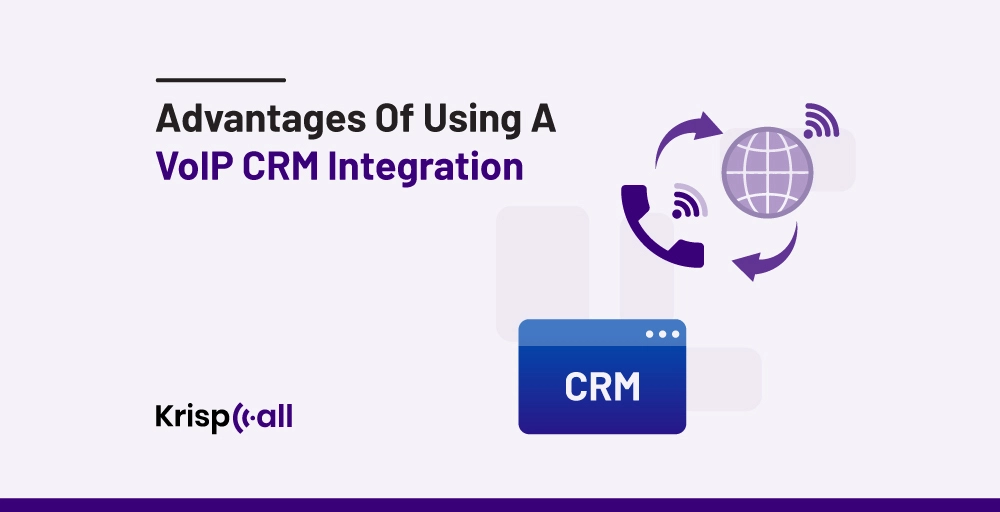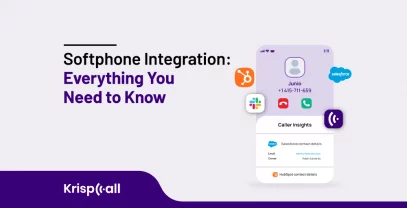VoIP CRM integration enables better management and monitoring of business relationships. It enables data exchange between your CRM and business phone system.
Amazing, isn’t it? 😀
These are just a few of the numerous advantages of VoIP CRM integration. Multiple techs and other Small and Midsize Enterprises (SMEs) who deal with their customers over the phone to solve their queries prefer integrating their VoIP phone system with CRM software.
The VoIP market is booming, and it is expected to reach $183.7 billion by 2027 📈. Given this growth, every business utilizing VoIP needs to understand CRM integrations and implementation thoroughly.
In this blog, you’ll learn detailed information 📚 about VoIP CRM integration including what it is, how to implement it, important considerations, and the top 5 advantages.
Let’s get started 🚀
🔑 KEY Summary
- VoIP CRM integration is linking your VoIP phone system with CRM software.
- It syncs all data and information between VoIP and CRM software.
- VoIP CRM integration offers advantages such as direct calling from CRM, improved customer experience, efficient and organized data, cost savings, and increased productivity.
- Before implementing a VoIP CRM integration in a business, you must set the integration objectives, choose a VoIP and CRM system, check for API documentation, plan integration points, do data mapping, test, monitor, and maintain integration performance.
- Evaluating business needs, checking reviews and rating sites, checking CRM features, and researching providers are the factors to consider while implementing VoIP CRM integration.
What is VoIP CRM integration?
VoIP CRM integration is a combination of a VoIP (Voice over Internet Protocol) phone system and Customer Relationship Management (CRM) software. Integrating VoIP phone systems with CRM software automatically syncs all data and information between both systems.
For telesales companies or businesses that interact with customers over the phone, not having a CRM system is like not having a business at all. CRM software is crucial because it lets you record every detail and customer interaction accurately.
When you sync important information between your VoIP phone system and CRM software, it significantly reduces the workload for agents, making their jobs much easier.
Similarly, CRM integration in the VoIP phone system keeps customer information organized and accessible. It enhances the flow of information between business and customers, leading to higher sales volume, better customer experiences, and the development of trust and loyalty toward your business.
5 advantages of using a VoIP CRM Integration
VoIP CRM integration changes how businesses connect with their customers. It allows businesses to manage customer interactions and enhance customer service at a low cost. It provides a unified system and tracks data across different channels and platforms.
Let’s have a look at the advantages of using VoIP CRM integration in a business:
1. Increased productivity
VoIP CRM integration can increase productivity by providing quick access to customer details and information, allowing seamless interaction between customers and businesses. It enables agents to manage calls directly from a CRM system, which reduces the time spent searching for customer details and information in a business.
Moreover, this allows businesses to access the data easily from one platform, and team members can better collaborate and respond quickly to solve customer queries. This streamlined workflow automatically increases employee productivity and leads to business growth.
2. Cost savings
VoIP CRM integration saves costs by making business processes more efficient. It automates tasks like logging calls and updating customer records, reducing employees’ time on manual data entry. This means fewer errors and less need for additional staff.
The integration also improves customer service by giving agents quick access to customer information, which helps resolve issues faster and keeps customers happy. Happier customers mean better retention and less money spent on acquiring new ones.
3. Efficient and organized data collection
When the VoIP system is integrated with CRM software, it records and stores all call data, such as call logs, history, recordings, and notes. Sales and marketing teams can easily access this data and organize it efficiently.
The collected data can be used for analytics and reporting, which helps improve customer service strategies. Also, when they have all the data regarding customers, the sales and marketing teams can offer personalized customer services.
4. Direct calling from CRM
VoIP phone systems with CRM integration enable agents or employees to call customers directly from the CRM software interface, eliminating unnecessary calling steps. With this integration, agents don’t need to switch between two different applications to search for customer contacts and call customers manually.
We all know looking up contact details in CRM software and making separate calls through a VoIP system is time-consuming. This integration ensures the calls are logged to the relevant customer so you can better follow up with customers to improve your relationship with them, build trust, and retain them for the long term.
5. Better customer experience
Integration of VoIP with CRM software improves overall customer experience. With this integration, agents have all the necessary contact data and information regarding customers, which helps them offer a more personalized interaction and address the customer’s needs.
When agents know customers and their issues or preferences, they can resolve them faster and offer proactive customer service/support. Continuously improving customer experience transforms customers into loyal customers and grows your business.
How to implement VoIP CRM integration?
Implementing VoIP CRM integration involves a few steps. The following are the steps to follow while implementing:
1. Set integration objective
Before starting the integration, it is necessary to understand what you want to achieve by integrating a VoIP system with CRM software. The goal and objective behind the integration of VoIP with CRM software may be to centralize communication, enhance data accuracy, improve customer services, increase workflow efficiency, and many more.
2. Choose a VoIP provider and CRM software
After setting an integration goal and objective, it’s time to choose a reliable VoIP service provider. Note that the VoIP phone system and CRM software must be compatible to complete integration and business objectives. Look for a VoIP provider with integration facilities with CRM software like KrispCall.
3. Check API documentation
Checking API documentation is necessary to understand how to interact programmatically with VoIP and CRM system integration. You must review and check the API documentation provided by the VoIP provider and CRM system. Understand APIs related to contact records, call logs, integration, etc.
4. Plan integration points
After selecting VoIP and CRM systems, plan and decide on the specific integration points where they will interact. Decide how VoIP call details, such as caller ID, call time, and durations, will be logged automatically in the CRM system. You must also determine how customer contact information will be recorded and displayed in CRM software so that agents will interact and offer personalized service.
5. Data mapping
Data mapping is the process of aligning fields from one system to another. It’s the initial step for moving data, combining data from different sources, and managing data effectively. Map data to optimize the integration functionality and increase the efforts to achieve the integration objectives.
6. Testing
Before fully implementing integration in a business, conduct the integration functionality, user acceptance, and reliability test. Test the various integration functions such as call logging, click-to-call actions, caller ID, contact information, and workflow automation to ensure proper call data management. Identify and correct any issues or bugs during the testing phase and ensure there are no disturbances or problems in VoIP CRM integration before implementing it.
7. Training and adoption
Jumping into a new system in a business requires related skills and training. So, train your employees to use integrated systems effectively. You can conduct training and develop programs to familiarize employees with VoIP CRM integration’s new features and functionalities, such as automated call logging, click-to-call, etc.
8. Monitoring and maintenance
Last but not least, the effectiveness of VoIP CRM integration in a business must be monitored.
Gather feedback from employees and stakeholders regularly to address any issues regarding the integration system. Implement regular maintenance and keep updates on both CRM and VoIP systems. This ensures the smooth functionality of the integration system.
What are the things to consider while implementing VoIP CRM integration?
Apart from all the benefits VoIP CRM integrations provide, you need to consider some important factors before implementing.
Here are the things to consider when integrating CRM with VoIP solutions.
- Evaluate business needs: Understand your needs to align your VoIP with the CRM integration perfectly. Answering questions like what kind of customers you have, your goal, and what impression you want customers to perceive can be the first valuable factors.
- Check reviews and rating sites: Customer reviews are always key to improving your VoIP solutions and increasing customer success. Check reviews from genuine and authentic sites like G2 reviews and TrustRadius to get insights into the experience of existing customers.
- Check the CRM features: Look after your VoIP solution’s customer relationship management (CRM) features. Some important features include automatically logging calls, capturing call details, and click-to-call.
- Research providers: Last but not least, one of the most important factors to consider is choosing a provider. Research each provider and their functionalities, and see if the features provided are needed for you and worth their prices.
Wrapping Up!
Integrating your VoIP phone system with existing CRM software can streamline communication and change how businesses interact with customers. VoIP CRM integration enables users to make direct VoIP calls from a CRM interface, offering the click-to-call option. It also improves the operation by automating call logs and providing comprehensive customer information and data to personalize customer interactions and services.
To successfully integrate VoIP with CRM, set clear objectives and choose compatible providers and software. KrispCall, for instance, is known for seamless integration with popular CRM systems like HubSpot, Pipedrive, Nimble, and many more.
By adopting VoIP CRM integration, businesses can elevate customer relationships and streamline operations, making it a smart move in today’s digital era.
FAQs
How does VoIP CRM integration improve customer service?
VoIP CRM integration enhances customer service by offering advanced tools that automatically bring customer profiles, call histories, and other pertinent details under one centralized dashboard. This integration eliminates manual data entry, minimizes errors, and ensures accurate documentation of every customer interaction. This also enables agents to provide more personalized and efficient service, ultimately improving overall customer satisfaction and retention.
What are the costs associated with VoIP CRM integration?
The costs associated with VoIP CRM integration can range from around $25 – $35 per user per month, but they depend upon factors like the size of your business (more users = higher cost), the specific features and functionality you need, and many more.
Can VoIP CRM integration benefit small businesses?
Yes, VoIP CRM integration can help small businesses. It improves their sales process and improves their customer service by offering them access to customer information and overall call history from the CRM system.





